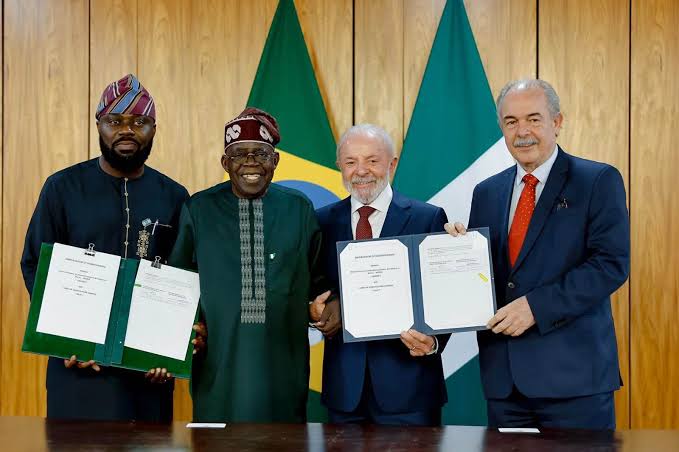The Bank of Agriculture (BOA) has welcomed the new agricultural agreement signed between President Bola Tinubu and Brazilian President Luiz Inácio Lula da Silva, describing it as a bold move that could transform Nigeria’s farming landscape.
In a statement, BOA’s Senior Manager and Head of Corporate Communication, Maikenti Akila, said the pact would open fresh channels of investment, accelerate technology transfer, and expand access to finance for farmers.
The memorandum of understanding, signed by BOA Managing Director Ayo Sotinrin and Aloizio Oliva, President of Brazil’s National Bank for Economic and Social Development, was sealed in the presence of both heads of state.
Akila explained that the agreement will see Nigeria and Brazil collaborate on three major fronts: the co-development of urea production projects for export to Brazil, joint investment in seed technologies for Nigeria in partnership with Brazil’s leading agricultural research agency, and the creation of a dedicated credit facility for agricultural equipment.
According to BOA, the credit scheme is structured to serve both smallholder farmers and large-scale agribusinesses, enabling them to acquire modern tools, mechanize production, and improve crop yields.
The bank stressed that improved access to financing will help raise productivity levels, enhance food security, and reduce Nigeria’s dependence on food imports.
“This is a landmark agreement that demonstrates the commitment of both leaders to sustainable agricultural growth,” BOA said. “It will stimulate local production, encourage research-driven innovation, and foster inclusive development across the entire value chain.”
BOA also commended Tinubu and Lula da Silva for recognizing the role of agriculture in driving economic diversification, describing the pact as “a strategic leap toward a more resilient and globally competitive Nigeria.”
Analysts note that Brazil, one of the world’s top agricultural exporters, has extensive expertise in agribusiness, biotechnology, and large-scale mechanized farming, while Nigeria holds vast arable land and an expanding domestic market.
They believe the partnership could reposition Nigeria as a key agricultural supplier to international markets, especially if supported by policies that guarantee accountability, transparency, and long-term investment.
With the facility targeting technology adoption and modern input supply, observers say the deal could help address persistent challenges such as low productivity, high post-harvest losses, and limited farmer financing.
BOA added that the collaboration reflects Tinubu’s broader drive to strengthen bilateral trade relations and deliver on Nigeria’s food security agenda.
“This agreement is not just about signing papers,” the statement read. “It is about building a sustainable future where Nigeria can feed itself, export competitively, and create millions of jobs in the process.”

